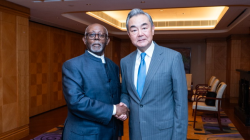Wang Yi and Global Officials Praise IOMed's Crucial Role in Dispute Resolution
Chinese Foreign Minister Wang Yi Meets with Global Officials at Hong Kong Ceremony for New Mediation Organization

Chinese Foreign Minister Wang Yi convened with an array of foreign diplomats on Friday in Hong Kong for the signing ceremony of the Convention on the Establishment of the International Organization for Mediation (IOMed). The high-profile diplomatic event saw participation from senior officials representing several continents, underscoring the global importance attached to this new institutional framework for dispute resolution.
During the intensive round of discussions, Wang Yi met individually with Zimbabwean Minister of Foreign Affairs and International Trade Amon Murwira, Beninese Foreign Minister Olushegun Adjadi Bakari, Swiss Federal Councilor and Foreign Minister Ignazio Cassis, Pakistani Deputy Prime Minister and Foreign Minister Mohammad Ishaq Dar, Cameroonian Minister of External Relations Lejeune Mbella Mbella, Mauritanian Foreign Minister Mohamed Salem Ould Merzoug, Nepali Foreign Minister Arzu Rana Deuba, and Lao Deputy Prime Minister Saleumxay Kommasith. The series of bilateral talks reflected the shared commitment among these nations to foster peaceful solutions to international disputes.
Wang emphasized that the IOMed represents a collective aspiration, especially among developing countries, for a new avenue in resolving disputes through peaceful dialogue and consultation. He characterized the organization as a significant “public product of the rule of law” that operates within the framework set by the United Nations Charter. According to Wang, by being jointly initiated by countries from the Global South, IOMed is poised to serve the interests of small- and medium-sized states, providing them with a platform to safeguard their legitimate interests and strengthen their voice in global governance.
In his remarks, Wang further highlighted that the establishment of the IOMed responds directly to the need for peace, security, and sustainable development. He noted that this new body reflects the prevailing trend towards win-win cooperation and could drive the evolution of international norms towards greater equity and justice. As the world’s first intergovernmental international legal organization specializing exclusively in dispute mediation, IOMed is expected to promote multilateralism, protect the interests of developing countries, and uphold the principles of fairness on the global stage.
Officials attending the event expressed strong support for the organization. Benin’s Foreign Minister Bakari affirmed that his nation would expedite the approval process for the convention, stressing its value for enhancing stability, particularly across Africa. Pakistani Deputy Prime Minister Dar praised China’s efforts in launching IOMed, describing it as a timely initiative that strengthens the multilateral system. He also announced Pakistan’s acceptance of China’s mediation proposal and the elevation of diplomatic ties with Afghanistan to ambassadorial level, underscoring the practical regional impact of the new organization.
Switzerland’s Foreign Minister Cassis recognized IOMed as a significant milestone in advancing mediation as a peaceful means of conflict resolution, and expressed optimism about expanded cooperation between Switzerland and China in this realm. Nepal’s Foreign Minister extended congratulations to China, noting that Hong Kong serves as an ideal headquarters location for the body. Meanwhile, Lao Deputy Prime Minister Saleumxay Kommasith stressed the cultural resonance of mediation in Asia and projected that the organization will attract broad participation, contributing meaningfully to regional peace and stability.
The establishment of the International Organization for Mediation marks a pivotal moment in global diplomacy, offering a fresh approach to settling disputes and reinforcing the rule of law. Its creation reflects a growing consensus among nations—particularly those from the developing world—on the value of dialogue and consultation in resolving conflicts and shaping a fairer international order.




